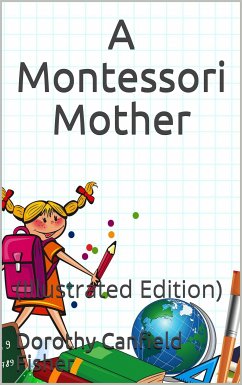This time we are drawing from the work of Dorothy Canfield Fisher, 1879-1978, who wrote extensively about Dr. Montessori’s work. In the following excerpt from her 1912 book, A Montessori Mother, she captures her early introduction to Dr. Montessori’s work.
In describing one of her visits to an early Casa, Fisher has a priceless account of a small child and a lunch napkin:
“The napkins were unfolded, the older children tucked them under their chins and began to eat their soup. The younger ones imitated them more or less handily, though with some the process meant quite a struggle with the napkin. One little boy, only one in all that company, could not manage his. After wrestling with it, he brought it to the teacher, who had dropped down on a chair near mine. So sure was I of what her action inevitably would be, that I fairly felt my own hands automatically follow hers in the familiar motions of tucking a napkin under a child’s round chin.
“I cannot devise any way to set down on paper with sufficient emphasis the fact that she did not tuck that napkin in. She held it up in her hands, showed the child how to take hold of a larger part of the corner than he had been grasping, and illustrating on herself, gave him an object-lesson. Then she gave it back to him. He had caught the idea evidently, but his undisciplined little fingers, out of sight there, under his chin, would not follow the direction of his brain, though that was evidently, from the grave intentness of his baby face, working at top speed. With a sigh, that irresistible sigh of the little child, he took out the crumpled bit of linen and looked at it sadly. I clasped my hands together tightly to keep them from flying at him and accomplishing the operation in a twinkling. Why, the poor child’s soup was getting cold!
In describing one of her visits to an early Casa, Fisher has a priceless account of a small child and a lunch napkin:
“The napkins were unfolded, the older children tucked them under their chins and began to eat their soup. The younger ones imitated them more or less handily, though with some the process meant quite a struggle with the napkin. One little boy, only one in all that company, could not manage his. After wrestling with it, he brought it to the teacher, who had dropped down on a chair near mine. So sure was I of what her action inevitably would be, that I fairly felt my own hands automatically follow hers in the familiar motions of tucking a napkin under a child’s round chin.
“I cannot devise any way to set down on paper with sufficient emphasis the fact that she did not tuck that napkin in. She held it up in her hands, showed the child how to take hold of a larger part of the corner than he had been grasping, and illustrating on herself, gave him an object-lesson. Then she gave it back to him. He had caught the idea evidently, but his undisciplined little fingers, out of sight there, under his chin, would not follow the direction of his brain, though that was evidently, from the grave intentness of his baby face, working at top speed. With a sigh, that irresistible sigh of the little child, he took out the crumpled bit of linen and looked at it sadly. I clasped my hands together tightly to keep them from flying at him and accomplishing the operation in a twinkling. Why, the poor child’s soup was getting cold!









